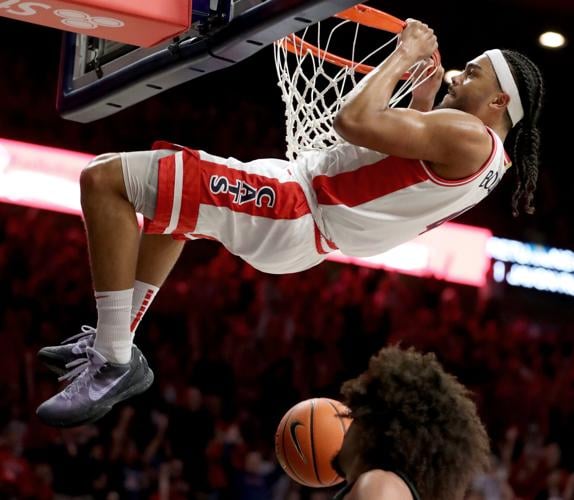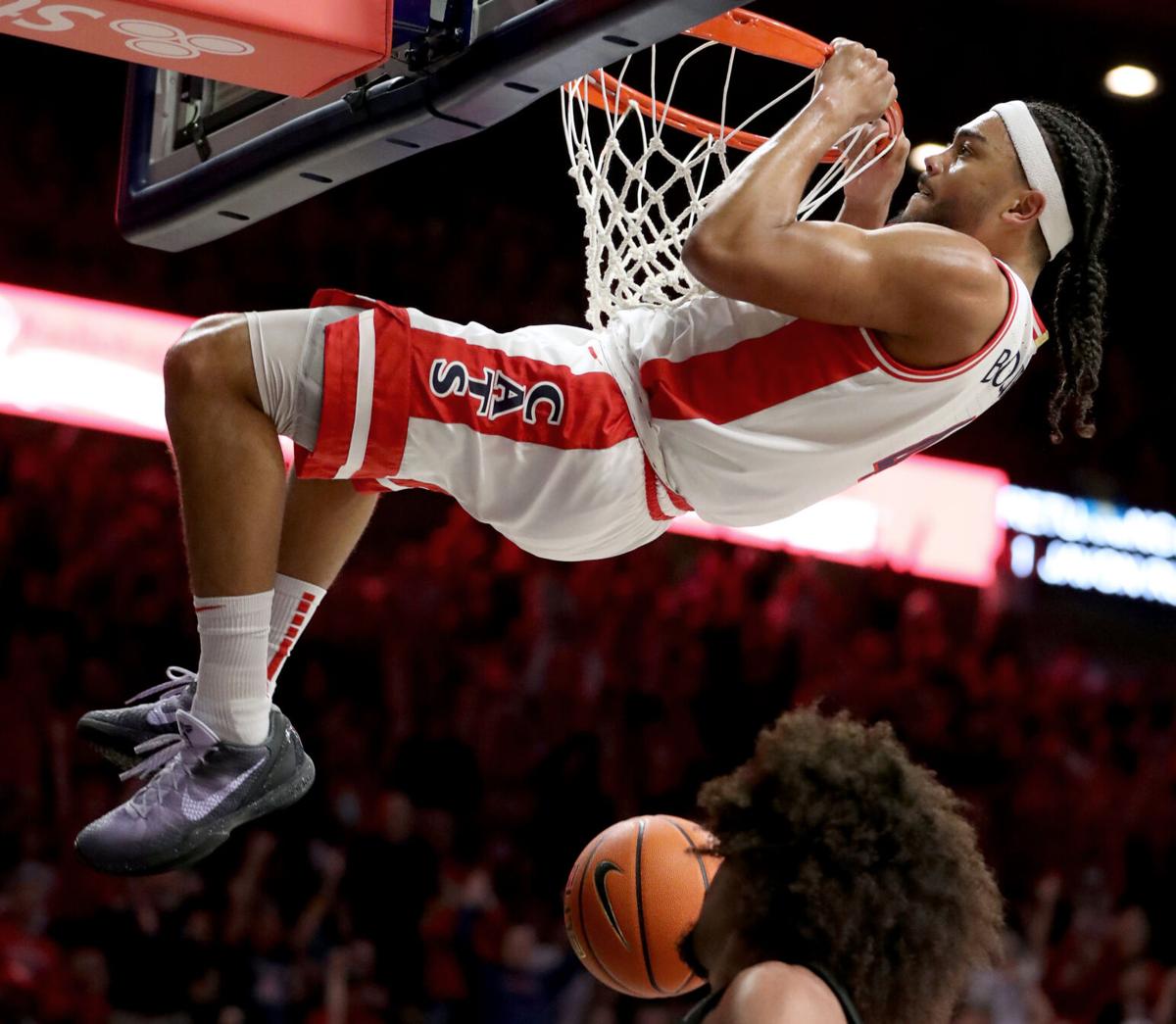In the middle of another record transfer portal season, Arizona has countered with a financial argument for its athletes to stay put.
During an “NIL open house” on Tuesday evening at the Arizona Hall of Champions, UA senior associate AD Brent Blaylock said Wildcat athletes reported 547 transactions worth an average of about $2,380 since Aug. 1, 2022, for a total of about $1.3 million.
“That’s a lot of money, and that’s something we’re really excited about,” Blaylock said.
While many high-major programs may be attracting even more — On3.com reported this month that an elite men’s basketball program might need six-figure deals for each starter and key reserve — UA’s figure doesn’t count unreported transactions and what athletes in men’s basketball and football are receiving from membership revenue of their collectives.
The Arizona Assist group, for example, has distributed “north of $100,000” in membership revenue and merchandise profit to UA men’s basketball scholarship players over the past year, according to co-founder Adam Lazarus, or an average of more than $8,333 per player.
On Tuesday, UA officials tried to pave the way for further deals by hosting an open house that included panel discussions among key UA athletes and NIL organizers while later asking business people interested in marketing via UA athletes to sit down at tables with 200 or so of those athletes.
“This was born out of an idea that we know there’s a lot of support in the community for our student-athletes, but we haven’t quite seen some of the engagement that correlates with that level of interest,” Blaylock said. “We know that the more people get to know our student-athletes, the more they’re going to want to work with them because of how great a representative they are for us and how they can be for other members of the community.
“So our thought is, if we bring everybody together into the room, let’s have student-athletes tell their story, talk about what’s important to them, talk about how they’ve been able to utilize other NIL opportunities. That will help facilitate future deals with those that are here.”
While terms of college athletes’ individual deals are typically not made public — and Blaylock said they remain a private part of their student records at UA — men’s basketball guard Kylan Boswell was among those already having benefited from NIL opportunities.
As a freshman last season, Boswell was featured in a Rancho Sahuarita television commercial and posted an Instagram reel endorsing “Rockin Protein” drinks produced by Phoenix-based dairy Shamrock Farms.
“It’s helped my family financiallty and helped myself feel more comfortable on campus,” Boswell said on the podium, where he was joined by women’s basketball player Maya Nnaji and softball player Allie Skaggs. The Rancho Sahuraita ad, in which Boswell lifted a child up to dunk a basketball, was a “very fun commercial” to put on.
Skaggs said NIL has also allowed her to shine a spotlight on mental health, noting that she even caught the attention of Olympic skier Lindsey Vonn, who has been open about a long battle with depression.

Arizona's Allie Skaggs, left, says NIL has allowed her to shine a spotlight on mental health.
“She’s amazing,” Skaggs said. “I didn’t know a lot about her until she DM’d me on Instagram. I told my parents and they were like, `Lindsey Vonn, are you kidding me?’ So I’ve worked with her a little. I need to share my own mental health journey. That’s something that means a lot to me.”
With a post-basketball goal of becoming a doctor, Nnaji said she has used NIL to facilitate food drives and other community service, “to just give to people and not receive anything for it.”
The wide potential for NIL was also a topic of the second panel that consisted of Lazarus, Joey Medina of Friends of Wilbur and Wilma, and Michael Ehrlich of Los Angeles-based MarketPryce.
A former executive at Adidas, Ehrlich said NIL is an “equalizer” because it doesn’t require signing the top athletes as he needed to do at the shoe company.
“We had to over invest in athletes who are the greatest at their sport,” Ehrlich said. “Now, with NIL there are athletes all over the country who actually fit (companies’) brands, and who are fans of them, consumers of them. Their morals and values align with brands’ values, and also they’re less expensive in some cases.”
While MarketPryce aims to connect athletes from UA and several other schools with companies who want athletes to market their products, Arizona Assist and Friends of Wilbur and Wilma also benefit athletes by giving them a share of the membership revenue they collect.
Arizona Assist specifically works with men’s basketball players, while Friends of Wilber and Wilma handles football players and other UA athletes. Arizona Assist gave away a free trip to the Maui Invitational last fall as a means to bolster its prospective membership base, then organized special events such as a team gathering at the Tempe location of Culinary Dropout before the Wildcats played at ASU last season.
Because international athletes risk their student visa status by actively working, Lazarus said they aren’t required to attend team events and are only paid for “passive” activities — such as receiving a share of membership dues or proceeds of a T-shirt that is produced with their name on it.
“We’re building a membership model that allows all the players, including the international players, to benefit from,” Lazarus said. “And we’ve gotten much more involved with connecting the businesses in town to the student-athletes.”
The benefits can hit pretty quickly, too.
Genesis Smith, an incoming freshman safety on the UA football team from Chandler, just arrived in time for the spring semester and spring football — but said he was already active with Friends of Wilbur and Wilma, which typically pays UA athletes for making charity appearances with money from membership revenue and donations.
“We went out to build houses and stuff like that,” Smith said. “It’s cool. They’re getting us out there to go and help the community. I like that part of it.”
UConn and Duke are frontrunners to cut down the nets, win next year’s NCAA Tournament






